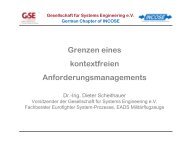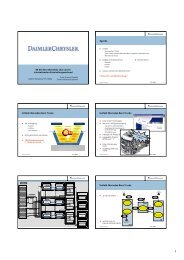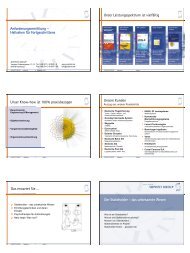Utilizing Mind Maps for Essential Use Case ... - Mind Map Options
Utilizing Mind Maps for Essential Use Case ... - Mind Map Options
Utilizing Mind Maps for Essential Use Case ... - Mind Map Options
Create successful ePaper yourself
Turn your PDF publications into a flip-book with our unique Google optimized e-Paper software.
Page 0<br />
<strong>Utilizing</strong> <strong>Mind</strong> <strong><strong>Map</strong>s</strong> <strong>for</strong> <strong>Essential</strong><br />
<strong>Use</strong> <strong>Case</strong> Specification<br />
Increase the Quality of <strong>Use</strong> <strong>Case</strong> Writing<br />
Process with a Light-weight Method<br />
© Vodafone Group 2005<br />
C2 COMPANY CONFIDENTIAL
Page 1<br />
Content<br />
_ Challenges to Service Specification<br />
_ <strong>Essential</strong> <strong>Use</strong> <strong>Case</strong>s<br />
_ <strong>Mind</strong> <strong>Map</strong>ping<br />
_ Matching <strong>Use</strong> <strong>Case</strong>s to <strong>Mind</strong> <strong><strong>Map</strong>s</strong><br />
_ <strong>Case</strong> Study ATARI Pong<br />
_ Benefits of <strong>Mind</strong> <strong>Map</strong> <strong>Use</strong> Casing<br />
© Vodafone Group 2005 11 March 2005
Page 2<br />
Content<br />
_ Challenges to Service Specification<br />
_ <strong>Essential</strong> <strong>Use</strong> <strong>Case</strong>s<br />
_ <strong>Mind</strong> <strong>Map</strong>ping<br />
_ Matching <strong>Use</strong> <strong>Case</strong>s to <strong>Mind</strong> <strong><strong>Map</strong>s</strong><br />
_ <strong>Case</strong> Study ATARI Pong<br />
_ Benefits of <strong>Mind</strong> <strong>Map</strong> <strong>Use</strong> Casing<br />
© Vodafone Group 2005 11 March 2005
Page 3<br />
Major Challenges in Service Requirements Elicitation<br />
Often speculative development<br />
Different languages<br />
Several cultural<br />
backgrounds<br />
No customer feedback<br />
© Vodafone Group 2005 11 March 2005<br />
Technicians and problem<br />
domain experts speak<br />
different languages<br />
Many opportunities:<br />
which to go, which to skip?<br />
Many ambiguities<br />
Service specification has to address many fuzzy variables
Page 4<br />
Content<br />
_ Challenges to Service Specification<br />
_ <strong>Essential</strong> <strong>Use</strong> <strong>Case</strong>s<br />
_ <strong>Mind</strong> <strong>Map</strong>ping<br />
_ Matching <strong>Use</strong> <strong>Case</strong>s to <strong>Mind</strong> <strong><strong>Map</strong>s</strong><br />
_ <strong>Case</strong> Study ATARI Pong<br />
_ Benefits of <strong>Mind</strong> <strong>Map</strong> <strong>Use</strong> Casing<br />
© Vodafone Group 2005 11 March 2005
Page 5<br />
<strong>Essential</strong> <strong>Use</strong> <strong>Case</strong>s Definition<br />
1. Simplified, abstract, generalized use case<br />
2. Captures the intentions of a user in a<br />
technology-free manner<br />
3. Structured narrative<br />
4. Expressed in the language of the<br />
application domain of users<br />
5. Simplified & abstract<br />
6. Technology-independent description<br />
7. One user task or user interaction<br />
Source: Constantine, Larry L.; Lockwood, Lucy A.D.: Software <strong>for</strong> <strong>Use</strong>, 1999<br />
Complete, meaningful, and well designed from the point-of-view of users<br />
© Vodafone Group 2005 11 March 2005
Page 6<br />
Detailed vs. <strong>Essential</strong> <strong>Use</strong> <strong>Case</strong>s<br />
Detailed use cases ...<br />
_ maintain focus on interaction<br />
between user and system<br />
under development<br />
_ make basic assumptions<br />
about the design<br />
_ deal with – at least – some<br />
technological constraints<br />
_ make assumptions on – at<br />
least – user-interface<br />
metaphors<br />
© Vodafone Group 2005 11 March 2005<br />
<strong>Essential</strong> use cases ...<br />
_ maintain focus on user's<br />
purposes<br />
_ keep the design as simple<br />
as possible<br />
_ assume perfect technology<br />
to directly translate user's<br />
goals into tasks (keeping the<br />
design flexible)<br />
_ help to derive user-interface<br />
architecture design<br />
<strong>Essential</strong> use cases are meaningful and designed from the point-of-view of users
Page 7<br />
<strong>Use</strong> <strong>Case</strong>s Sample in Diagram Form<br />
<strong>Use</strong> case diagrams are not sufficient <strong>for</strong> grasping specifications<br />
© Vodafone Group 2005 11 March 2005
Page 8<br />
<strong>Use</strong> <strong>Case</strong>s Sample in Page Template Form<br />
<strong>Use</strong> case sheet templates are specific, but linear, and top to bottom<br />
© Vodafone Group 2005 11 March 2005
Page 9<br />
Content<br />
_ Challenges to Service Specification<br />
_ <strong>Essential</strong> <strong>Use</strong> <strong>Case</strong>s<br />
_ <strong>Mind</strong> <strong>Map</strong>ping<br />
_ Matching <strong>Use</strong> <strong>Case</strong>s to <strong>Mind</strong> <strong><strong>Map</strong>s</strong><br />
_ <strong>Case</strong> Study ATARI Pong<br />
_ Benefits of <strong>Mind</strong> <strong>Map</strong> <strong>Use</strong> Casing<br />
© Vodafone Group 2005 11 March 2005
Page 10<br />
Learn <strong>Mind</strong> <strong>Map</strong>ping in 7 Steps<br />
1. Take a piece of paper and draw an ellipse in the centre<br />
2. Inside the ellipse write the name of the topic<br />
3. For each major idea draw a line radiating from the ellipse<br />
4. Write a keyword above each branch<br />
5. The keyword is ...<br />
_ a variation of an existing idea: draw a branch off of the central line and<br />
label it<br />
_ something totally and utterly new, then draw a brand new line from the<br />
centre ellipse<br />
6. „Shape“ the mind map by completing it balanced in every direction<br />
7. Once finished generating keywords you can start analysing the<br />
map: look <strong>for</strong> linkages, thus, rearrange the map<br />
<strong>Mind</strong> maps are records of thought processes – be it private or in a group<br />
© Vodafone Group 2005 11 March 2005
Page 11<br />
<strong>Mind</strong> <strong>Map</strong> Samples (1)<br />
Colors, symbols , and icons increase benefits of mind mapping<br />
© Vodafone Group 2005 11 March 2005
Page 12<br />
<strong>Mind</strong> <strong>Map</strong> Samples (2)<br />
Manually drawn mind maps enhance your creativity<br />
© Vodafone Group 2005 11 March 2005
Page 13<br />
<strong>Mind</strong> <strong>Map</strong> Samples (3)<br />
<strong>Mind</strong> map styles mirror your personal attitudes<br />
© Vodafone Group 2005 11 March 2005
Page 14<br />
<strong>Mind</strong> <strong>Map</strong> Software<br />
_ Windows plat<strong>for</strong>m<br />
• ConceptDraw<br />
• Visual <strong>Mind</strong> 6<br />
• <strong>Mind</strong>Manager X5 Pro<br />
• <strong>Mind</strong>Genius Business 2005<br />
• Openmind<br />
© Vodafone Group 2005 11 March 2005<br />
_ Mac OS X plat<strong>for</strong>m<br />
• <strong>Mind</strong>mapper<br />
• Nova<strong>Mind</strong><br />
• My<strong>Mind</strong><br />
_ OpenSource<br />
• Freemind<br />
• e<strong>Mind</strong>map<br />
<strong>Mind</strong> map software enhances flexibility of the mind mapping process
Page 15<br />
Content<br />
_ Challenges to Service Specification<br />
_ <strong>Essential</strong> <strong>Use</strong> <strong>Case</strong>s<br />
_ <strong>Mind</strong> <strong>Map</strong>ping<br />
_ Matching <strong>Use</strong> <strong>Case</strong>s to <strong>Mind</strong> <strong><strong>Map</strong>s</strong><br />
_ <strong>Case</strong> Study ATARI Pong<br />
_ Benefits of <strong>Mind</strong> <strong>Map</strong> <strong>Use</strong> Casing<br />
© Vodafone Group 2005 11 March 2005
Page 16<br />
Surprising Similarities between <strong>Use</strong> <strong>Case</strong>s & <strong>Mind</strong> <strong><strong>Map</strong>s</strong><br />
Be precise<br />
Elicitate what is in your mind<br />
Be structured and open-minded<br />
Run „embedded processes“<br />
Be light-weighted, but fully-fledged<br />
Adjust to personal preferences<br />
Alter easily in granularity<br />
© Vodafone Group 2005 11 March 2005<br />
<strong>Use</strong> <strong>Case</strong>s <strong>Mind</strong> <strong><strong>Map</strong>s</strong><br />
Address a big picture & details<br />
simultaneously <br />
<br />
<br />
<br />
<br />
<br />
<br />
<br />
<strong>Mind</strong> maps and use cases have a common denominator
Page 17<br />
Content<br />
_ Challenges to Service Specification<br />
_ <strong>Essential</strong> <strong>Use</strong> <strong>Case</strong>s<br />
_ <strong>Mind</strong> <strong>Map</strong>ping<br />
_ Matching <strong>Use</strong> <strong>Case</strong>s to <strong>Mind</strong> <strong><strong>Map</strong>s</strong><br />
_ <strong>Case</strong> Study ATARI Pong<br />
_ Benefits of <strong>Mind</strong> <strong>Map</strong> <strong>Use</strong> Casing<br />
© Vodafone Group 2005 11 March 2005
Page 18<br />
<strong>Case</strong> Study: History of ATARI‘s Pong<br />
_ In June 1972 Nolan Bushnell and Ted Dabney founded ATARI<br />
_ By chance the electric sound of a ball hitting the bat is the reason <strong>for</strong><br />
naming the game „Pong“<br />
_ It was the first worldwide<br />
known video game<br />
_ It had 4 game modi<br />
• Tennis<br />
• Squash<br />
• Training<br />
• Soccer<br />
A simple game – a simple specification<br />
© Vodafone Group 2005 11 March 2005
Page 19<br />
Pong Screenshot<br />
Pong comprises less actors and few rules<br />
© Vodafone Group 2005 11 March 2005
Page 20<br />
Pong <strong>Use</strong> <strong>Case</strong>s <strong>Mind</strong> <strong>Map</strong> Overview<br />
Main branches are use case or use case package titles<br />
© Vodafone Group 2005 11 March 2005
Page 21<br />
Pong <strong>Use</strong> <strong>Case</strong>s <strong>Mind</strong> <strong>Map</strong> with Titles and General Outline<br />
2nd level branches create the structure of a use case page template<br />
© Vodafone Group 2005 11 March 2005
Page 22<br />
Pong <strong>Mind</strong> <strong>Map</strong> <strong>Use</strong> <strong>Case</strong>s with Unlocked Text Notes<br />
Detailed in<strong>for</strong>mation is stored in text notes (unlocked or concealed)<br />
© Vodafone Group 2005 11 March 2005
Page 23<br />
Content<br />
_ Challenges to Service Specification<br />
_ <strong>Essential</strong> <strong>Use</strong> <strong>Case</strong>s<br />
_ <strong>Mind</strong> <strong>Map</strong>ping<br />
_ Matching <strong>Use</strong> <strong>Case</strong>s to <strong>Mind</strong> <strong><strong>Map</strong>s</strong><br />
_ <strong>Case</strong> Study ATARI Pong<br />
_ Benefits of <strong>Mind</strong> <strong>Map</strong> <strong>Use</strong> Casing<br />
© Vodafone Group 2005 11 March 2005
Page 24<br />
What <strong>Mind</strong>map <strong>Use</strong> <strong>Case</strong>s distinguishes from Linear <strong>Use</strong> <strong>Case</strong>s<br />
1. Vague in<strong>for</strong>mation (during discussion, from „shadow“ stakeholders,<br />
due to unprecedented creative ideas) can be added instantly<br />
2. No in<strong>for</strong>mation gets lost during extensive use case elaboration<br />
3. Fast swap between specification big picture and every single detail<br />
4. Packages can easily be rearranged; package alternatives are<br />
simpler to identify<br />
5. <strong>Map</strong>ping means a specific style of thinking: it can be conveyed to<br />
other phases of requirements elicitation (e.g. the Walt-Disney-<br />
Conference model)<br />
6. Enhances hithero use case writing procedures – it‘s not supposed<br />
to replace them (esp. in detailed use casing)<br />
Learn mind mapping and use casing independently, then match to your needs<br />
© Vodafone Group 2005 11 March 2005
Page 25<br />
© Vodafone Group 2005 11 March 2005<br />
Stefan Holtel<br />
<strong>Use</strong> <strong>Case</strong> Evangelist<br />
Vodafone R&D - D<br />
Vodafone Pilotentwicklung GmbH<br />
Chiemgaustr. 116<br />
81549 Munich<br />
Germany<br />
+49 89 95410 516<br />
+49 89 95410 111<br />
stefan.holtel@vodafone.com<br />
www.vodafone-rnd.com






